Table of contents




Table of contents
The flexible office spaces sector never felt so corporate. For a few years now we have witnessed a growing tendency among big corporations (national and international ones) towards a workplace solution far away from the strict conventional office. The corporate coworking is now one of the favourite alternatives when developing their workplace strategy. In the short run, but in the long run too. Hello, everyone! My name is María Elipe and I am Corporate Account Manager in Lexington: I am responsible for all these workspaces requests from bigger companies with bigger teams, bigger needs and the biggest expectations. Today I want to share with all the Lexington Magazine readers some insights about what corporate coworking means and why flexible office spaces are now officially the high-profile companies’ favourite pick.
A corporate flexible office space is a workplace formula that combines everything that is good about coworking and the ability of facing the most specific needs such company may come upon.
Even though benefits from flexible workspaces can indeed extrapolate to corporate companies as well as freelancers and smaller business (strategic location, savings from fixed costs…), big corporation’s necessities and processes are harder to follow sometimes.
This is the reason why flexible corporate office spaces also include aspects such as brand identity, corporate culture, sustainability, energetic efficiency rates and personalisation within the workspace.
The main difference between these two concepts (and the most visual one, actually, the one that makes our dubitative clients click) is the target on one hand and the nature of the space on the other.
Sure, flexible workspaces on a more corporate side can also adapt to a freelancer’s necessities (those professionals that instantly come to our minds when thinking about coworking), but flex operators go beyond. This new way of understanding workspaces allows not only individuals but bigger teams to thrive, offering a broader and more personalised service, no matter their size or field. Let me tell you now why every company needs flexible workspaces, because they do!
While coworking strongly focuses on hot desking with open workstations shared with the rest of the community, the concept of flexible office space opens up to this innovative combo: a private space for each company and their team (able to adjust to whatever working model they prefer) + common working and break areas, meeting rooms to book for hours and many other hubs such as phone booths, kitchen areas, coffee points…
Briefly, we could say that coworking is only a small portion of what flexible workspaces entail. Hot desking for individual professionals is also possible in this flexible office space, but the possibility of customised office spaces cohabits with it.
You might be interested
You might be interested
Key ways to Attract and Retain Talent in Your Business

María Luisa Navarrete


You might be interested
You might be interested
How workspaces have evolved: from coworking to the hybrid formula

María Elipe
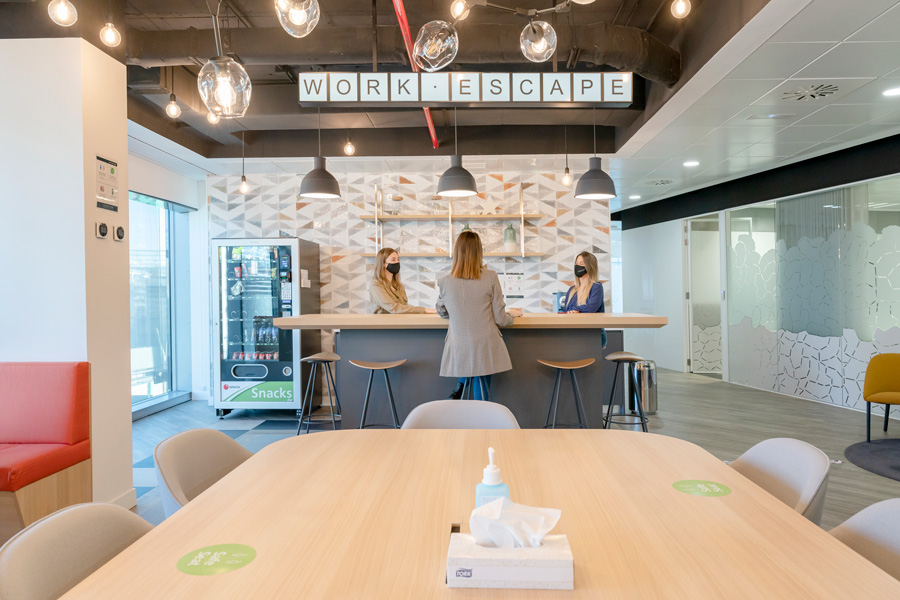

You might be interested
You might be interested
Putting faith on a hybrid model: teleworking and on-site working

Ester Maicas
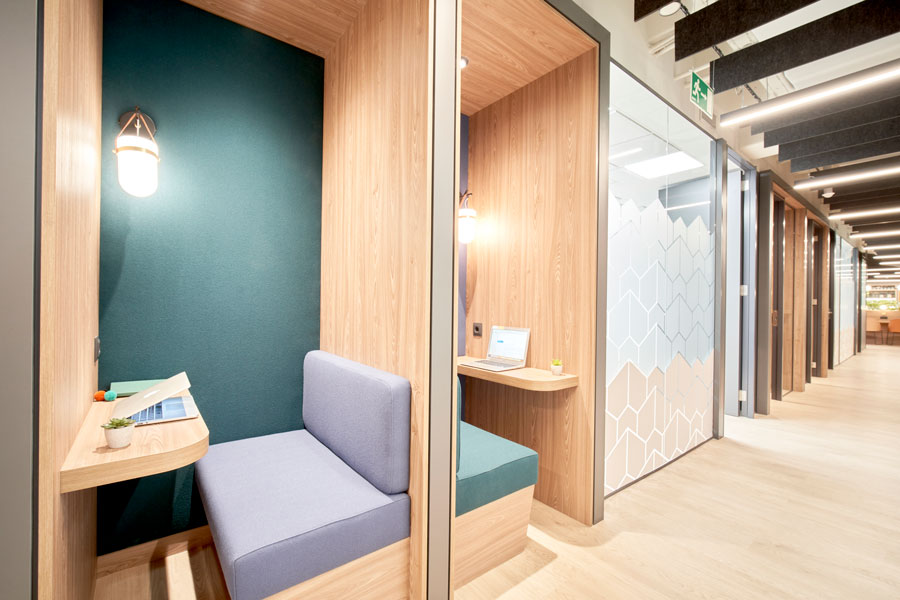

You might be interested
You might be interested
How to maintain a strong company culture in a hybrid work model

María Abraín


You might be interested
You might be interested
Coworking for big companies: corporate’s favourite flex solution

Soraya Albaladejo
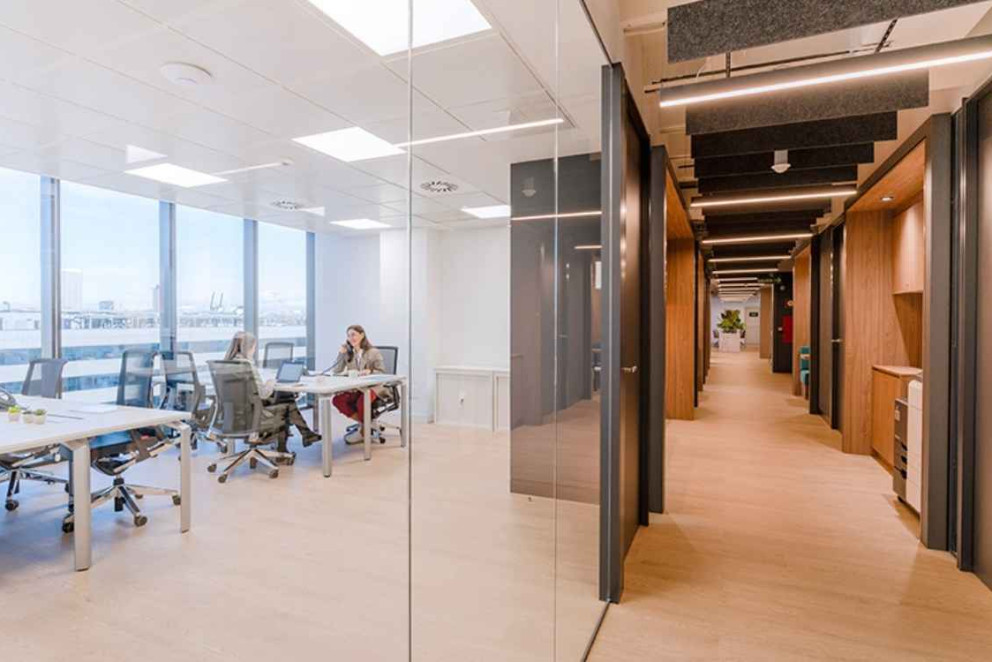

You might be interested
You might be interested
Private offices in Madrid
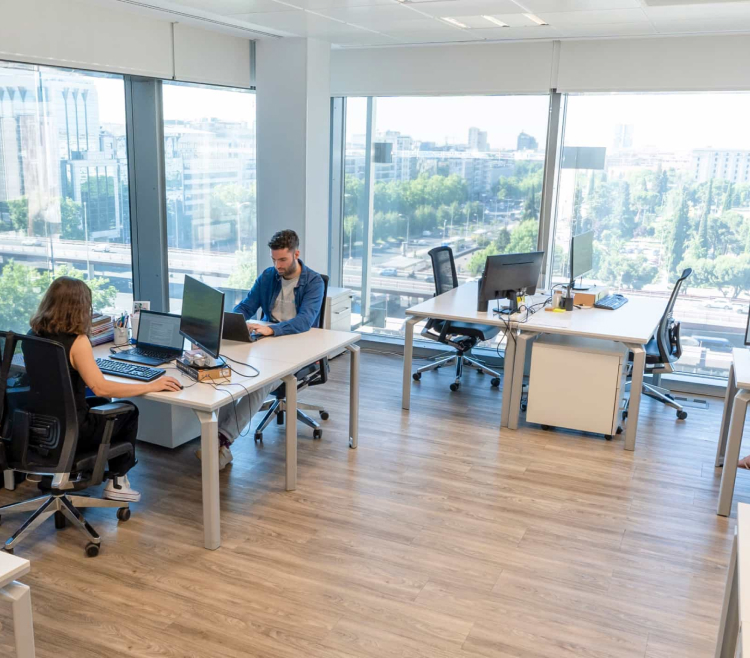

You might be interested
You might be interested
Private offices in Barcelona
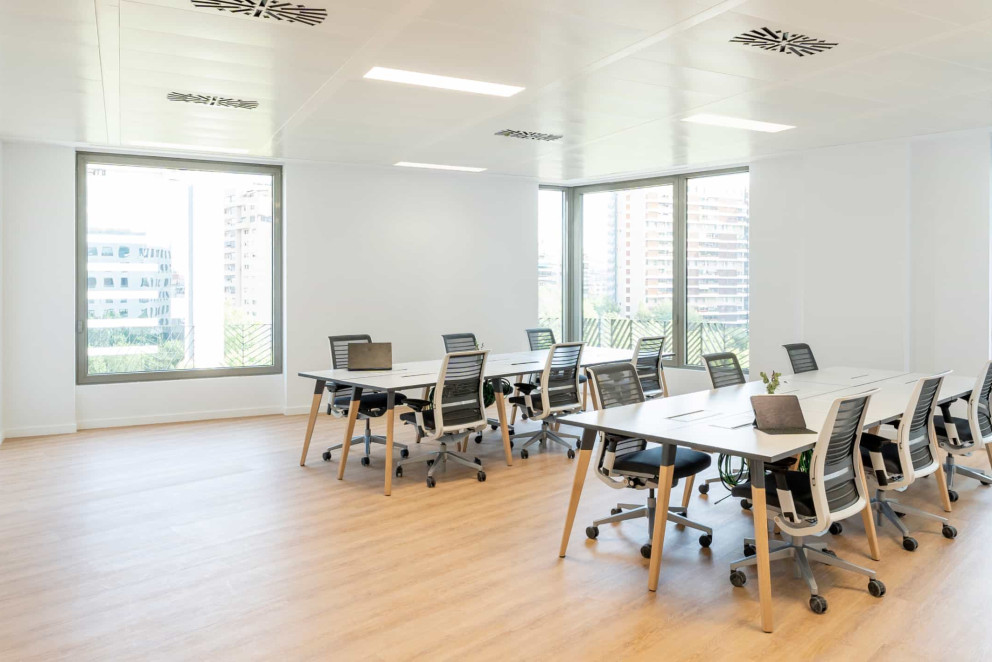

You might be interested
You might be interested
Private offices in Madrid


The pandemic is not the only reason this exodus is taking place, it started years ago, but we cannot deny that uncertainty and the changing energy COVID left us has pushed big corporations towards hybrid workspaces for their office comeback. Our specialisation on this corporate profile does not come from 2020 either, it has been out signature for various years now.
The secret is that, before COVID, these corporate companies’ needs could be covered by a conventional office sometimes. However, many corporations still chose flex for all its benefits.
Nowadays (and from now on ;)), the hybrid working model, employees’ new priorities and the new global mindset have made flexible workspaces the only formula able to cope with all that committed to their project and workforce companies need.
For context’s sake, and for you to understand the reasoning behind corporate profile companies choosing flexible workspaces, these are some of the key decision drivers:
The standard corporate client in Lexington is a company committed to the environment and whose global strategy includes sustainable standards to meet. These parameters are obviously transferred to their flexible workspaces search.
Flex operators’ buildings are energetically efficient by definition, given that they are located in strategic points in the city. Point checked, then! All our spaces work under a strict policy of renewable energies, zero waste and zero plastic routines and sustainable initiatives such as our we make it eco.
A thoroughly chosen business address not only will it help with your company’s brand awareness, but also with the belonging feeling of your teams and their positiveness. Being close to the public transport, parking areas and a ton of possibilities within 5 minutes from the office is a game-changer!
It is no secret that the location of their office space can help a company * a lot* but, what about the office itself? The office space has to be up to the challenge as well, meeting the team’s expectations and needs.
Flexible workspaces will want to be enough to accommodate the whole team, including sufficient room for meeting points or common areas for them exclusively. Sufficient, yes, but that’s not all of it! Meeting and training rooms, one-to-one hubs and more broad open common areas, wellness and snack points with vegetarian/vegan and gluten/lactose free products, showers and whatnot are also key for companies looking for versatility for their office space.
A critical factor to close deals with these big corporations is the adaptability and flexibility in contract periods and terms. The reason behind conventional offices not being trending anymore is this one, precisely: stiffness and long commitments were only a burden for companies, a heavy wheight upon their shoulders.
However, this is not only about leaving the office space whenever the company stops needing it, but about the ability these contacts have to reshape and follow each company’s rhythm.
Now that I’m officially the editor of the month and having studied endless flexible workspaces requests from the *biggest* corporations, today I will be sharing with you some of the key aspects on which our proposals are based!
Corporate requests back in the day circled around mostly open-spaces, with a huge support from common areas and meeting rooms to book by the hour. Adaptable size was always a variable to consider, same as the location in the financial core of the city and the reasonable contract periods, far away from conventional ones.
The pandemic came and passed, but the corporate presence in flexible workspaces stayed (and continued growing!). Their priorities did not change, but matured.
The simple open-space got more complex towards customised office spaces with personalised layout, exclusive phone booths, meeting rooms and branding,
Nonetheless, if we had to highlight the most significative changes, those should be the switch from being a temporary workplace solution to a definitive one, and the hybrid way of working. Such formula has upgraded workspaces on its own, since flexible offices are the only ones capable of accommodate such new routines, connect the whole team and spread your employees worldwide.
Do you still believe that flexible workspaces are no place for a big corporation? Well. I beg to differ. Me and the 85% of international companies with a flexible office space in Lexington 😉.
Written by

Our Corporate Account Manager has more than 10 years of experience behind her, helping our customers to reach the finish line, to achieve their goals and to meet their expectations. How? With a tailor-made workplace strategy and a personalised office space. Her touch is unique, and so is she! Maria is a passionate tv-show fan, a literature lover and a vinyl record enthusiastic.
Related articles
Get up to date with flex
Subscribe to our newsletter to make sure you don't miss anything. On trend content you’ll be interested in.
Contact us
Request information
Solicitar información free pass
Request a quote
Visit our spaces
Trabaja con nosotros
Contact us
Work in a flexible space.
Optimize on costs compared to a conventional office
Estimation of costs compared to conventional office hire
0 people Office for
Select
5 people
10 people
15 people
25 people
Select a number of people and we’ll show you the expenses included in our flexible office hire.
Conventional office
Operational costs and supply costs:
€/month
+ opening expenses
Flexible office
Operational costs and supply costs:
Included
No opening expenses
Included in the monthly bill
€517.01/person
0€
2.264,24 €/person
0€
523,69 €/person
0€
Guarantee bond
6 months
Deposit
2 months
Since
12 months
Since
1 month
2-6 months
2 months
Request a quote